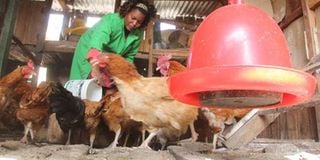With crossbreeding, I get more from my kienyeji chickens

Leah Muthoni in her poultry farm in Nyeri. The farmer crossbreeds her Kienyeji chickens for more income. PHOTO | JOSEPH KANYI |
What you need to know:
- Leah crosses her chickens to get broilers that weigh more and hens that lay many eggs for high income.
The first thing that catches your eye when you arrive at Leamose Poultry Farm is a flock of multi-coloured indigenous chicken darting joyously from side to side inside a wire mesh fenced compound.
The farm at Kabiruini village near the Nyeri showground and Dedan Kimathi University of Technology belongs to Leah Muthoni who crossbreeds indigenous chicken with exotic ones to improve productivity.
Leah likes the crossbreed chickens because they are resistant to diseases and mature faster than the local Kienyeji chicken.
We found Leah this week in a green apron cleaning the water traps inside one of the chicken cages while feeding them with maize germ.
She directs one of her farm workers to lead us in.
SUPPLY EGGS
“Cleanliness is what has ensured my chickens do not contract diseases easily,” she tell us.
Leah is keeping over 200 indigenous mature chickens, after she sold more than 500 others over the last holidays.
She supplies the eggs and sells the mature birds to hotels and various supermarkets in Nyeri town. She also sells chicks to other farmers who come from as far away as Laikipia, Meru and Kirinyaga.
The farmer went into poultry farming in 2013, with six Kienyeji chickens.
“My husband, a former police officer, then went to the bank and got me a loan of Sh400,000 with which I bought a hatchery, brooders, a water tank and water traps. I also installed electricity and constructed cages.”
She then enrolled in a poultry farming training which was organised by the Ministry of Agriculture.
It is here that she was introduced to the Kenya Agricultural and Livestock Research Organisation improved kienyeji chicken, now just referred to Kari Kienyeji after the institution’s former name.
“The chickens are highly resistant to diseases and have high productivity levels in terms of egg and meat quality,” she says.
She went on and bought a number of indigenous breeds, the local Kienyeji chickens, the Kari Naivasha, the Kenbro, Kuroiler and the Dorep indigenous chickens putting them all in separate cages.
In another separate cage, Leah started cross-breeding the local Kienyeji chicken with the cocks from the Kuroiler, Dorep and Kenbro chicken breed which are known to gain weight faster than the local Kienyeji.
These improved chickens can gain weight of up to 4.5kg when mature.
Soon after the hen starts laying, the eggs are kept inside a locally made hatchery for 21 days and then the new cross bred bird is hatched.
The chicks are then transferred to a different cage where they are fed with chick mash for seven weeks.
She then transfers them from the chicks cage to a cage where they can move freely until they are four to six months when they are ready for sale.
They can also be sold as three-week old chicks. They go for Sh150 each. The remaining chicks are then reared until three months before she allows them to mix with other chickens.
BIGGER BIRDS
Leah says she is able to hatch over 200 chicks every month from the different breeds.
She notes just like the Improved Kari Naivasha indigenous chickens, her cross-bred indigenous chickens have very few health problems after being vaccinated and their eggs are larger than the local Kienyeji chickens.
“The fact that I am rearing indigenous chickens has made my business to thrive in region where many prefer them to exotic ones.”
She vaccinates the chicken after every two to three months against, especially, Newcastle disease.
The chicks are injected for the first time two weeks after hatching.
According to Wairimu Kariuki, the chairperson of the Kenya Poultry Farmers Association, improved indigenous chickens are cheap and easy to rear.
“The cross-bred chickens have all the characteristics of indigenous chickens but with an added advantage of laying more eggs and maturing faster than the local indigenous ones.”
She says after the Kari improved indigenous chicken, farmers have been trying different ways of cross-breeding local chickens with exotic ones.
Wairimu said cross-breeding local Kienyeji chicken with the Dorep results in bigger birds which fetch a lot of money when sold.
She, however, warns that farmers who are cross-breeding their chickens should always ensure that the locally cross-bred ones are kept in separate cages from the original breeds to ensure they don’t extinguish the original traits.
She says poultry farmers should vaccinate the chicken after every 10 weeks to keep away diseases like Newcastle which is a big threat to poultry farmers.
Wairimu also says farmers should ensure that the chicken cages are cleaned regularly and provide enough water for them to grow healthy.
To keep them healthy, Leah feeds the birds with kitchen waste, sunflowers, cereals, fish meal, green grass and maize germ.
HIGH DEMAND
She keeps her chickens in a large fully fenced compound where they can scavenge and get insects.
The chickens are sold in terms of kilos with each going for Sh450. She is able to raise a net of between Sh80,000 to Sh120,000 monthly from selling the crossbred chickens, the original breed chicks and eggs.
The eggs from the Kenbro, the Dorep indigenous chickens and the cross-bred indigenous chickens are always in high demand with one selling at between Sh30 to Sh35. The eggs from the local Kienyeji go for between Sh20 to Sh25.





